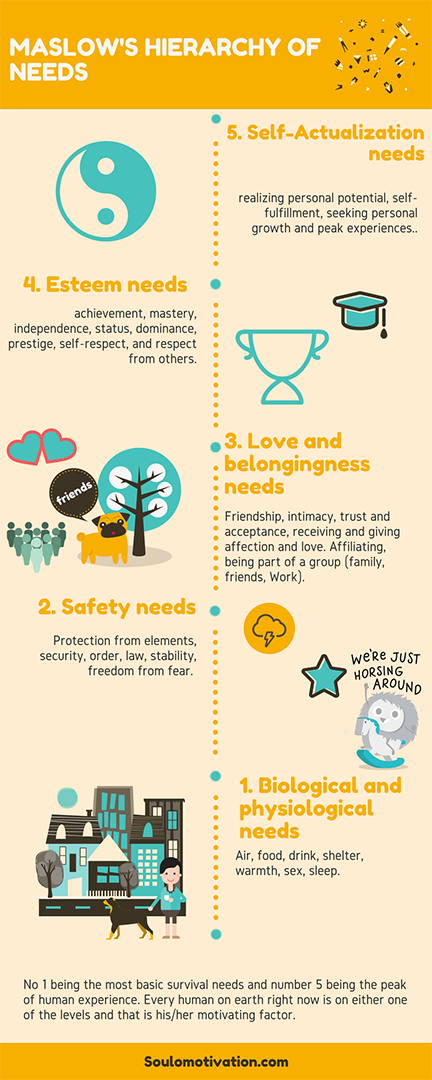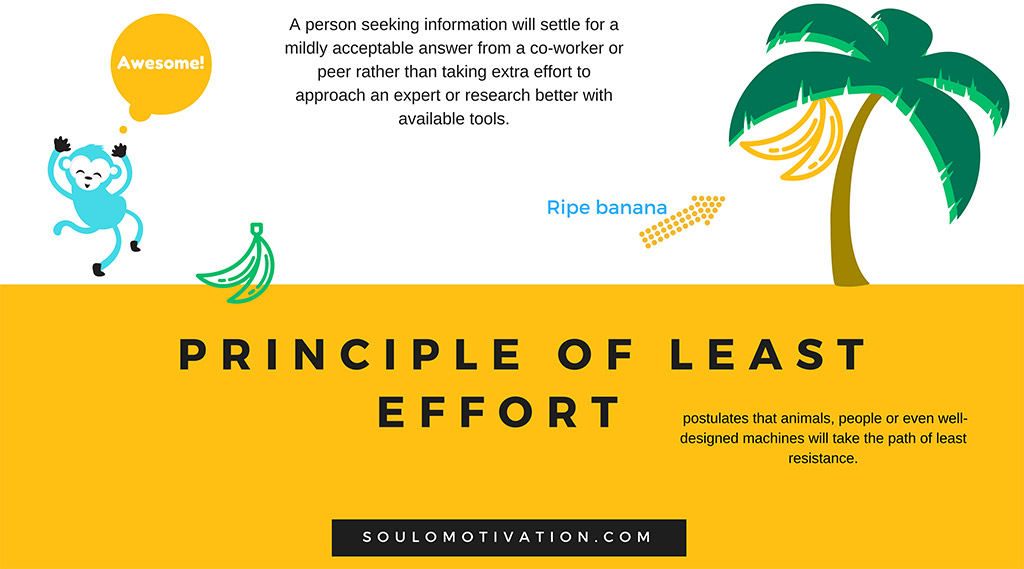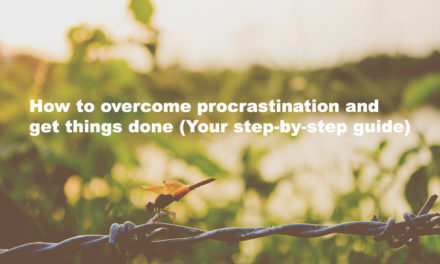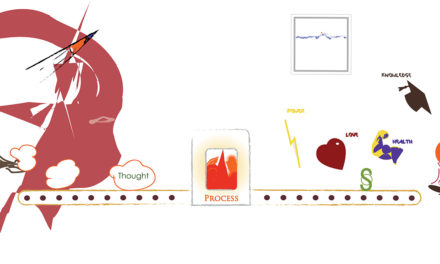Table of Contents
- “Intellectual growth should commence at birth and cease only at death.” – Albert Einstein
- 1. Maslow’s law or Hierarchy of Needs
- 2. Principle of least effort
- A page about the principle of least effort on Wikipedia says this:
- “The principle of least effort is a broad theory that covers diverse fields from evolutionary biology to webpage design. It postulates that animals, people, even well-designed machines will naturally choose the path of least resistance or “effort.”
- This is perhaps best known or at least documented among researchers in the field of library and information science.
- Their principle states that an information-seeking client will tend to use the most convenient search method, in the least exacting mode available. A person’s information seeking behavior stops as soon as minimally acceptable results are found. This theory holds true regardless of the user’s proficiency as a searcher, or their level of subject expertise.
- Also, this theory takes into account the user’s previous information-seeking experience. The user will use the tools that are most familiar and easy to use that find results.
- The principle of least effort applies not only in the library context, but also to any information-seeking activity. For example, one might consult a generalist co-worker down the hall rather than a specialist in another building, so long as the generalist’s answers were within the threshold of acceptability.”
- 3. Parkinson’s Law
- 4. Pareto principle
- The Pareto principle (also known as the 80/20 rule, the law of the vital few, or the principle of factor sparsity) states that, for many events, roughly 80% of the effects come from 20% of the causes.
- Management consultant Joseph M. Juran suggested the principle and named it after Italian economist Vilfredo Pareto, The original observation was in connection with population and wealth. He noticed that 80% of Italy’s land was owned by 20% of the population.
- Conclusion
“Intellectual growth should commence at birth and cease only at death.” – Albert Einstein
Quick announcement, before the post itself, I just want to tell you that I released two videos recently, titled, “Thoughts on Life as a 30-Year Old” and “Why Happiness Eludes Us, Our Quest for Things” respectively. If you find the topics interesting I invite you to watch them and let me know your thoughts in the comments.
Now let us begin.
What I am about to share with you here has been known for a century or more and many have increased their productivity by understanding this.
If you are one of those people who read a lot you might already be familiar with all the theories or laws that I am going to list below.
However, for those who are not familiar with them, they are a great thing to go through. Because they help you change your perspective on productivity and life and thereby motivate you to do better.
These theories or laws will enable you to evaluate yourself, know why you make certain decisions, and understand if you are really productive. Knowing how and why we act in a certain way gives us the power to change that pattern, and break that pattern.
You can also use this knowledge to construct a pattern that easily integrates these laws into your routine, making it easier for you to act on your goals.
I am not saying I have done the research and this is some brand new information, so I will be citing a bulk of information from credible sources, which have already done a great job in delivering the exact and precise essence of the subject matter, additionally, I will add some of my own insights to let you know my thought process on this particular matter.
So let’s get started.
1. Maslow’s law or Hierarchy of Needs
The Theory was proposed by Abraham Maslow in his 1943 paper “A Theory of Human Motivation” This theory is notably depicted as a pyramid.
In this Pyramid, the most basic desires of our human lives occupy the largest and bottom part of the pyramid and those related to self-actualization and self-transcendence are at the very top.

The hierarchy of needs pyramid includes:
1. Biological and physiological needs: Air, food, drink, shelter, warmth, sex, sleep.
2. Safety needs: Protection from elements, security, order, law, stability, freedom from fear.
3. Love and belongingness needs: Friendship, intimacy, trust and acceptance, receiving and giving affection and love. Affiliating, being part of a group (family, friends, Work).
4. Esteem needs: achievement, mastery, independence, status, dominance, prestige, self-respect, and respect from others.
5. Self-Actualization needs: realizing personal potential, self-fulfillment, seeking personal growth and peak experiences.
You can read more about this here.
This can also be called the pyramid of human motivation. The pyramid lists all the things in life that motivate us to take action. Every human being on earth is on a different level of that pyramid and is motivated accordingly. Each of those needs is the driving force behind every human on earth right now.
So you cannot preach a hungry and homeless man about science or spirituality, because his most basic physiological needs are not even met. If a person is at level 1 of that pyramid, You cannot expect that person to jump to level 5.
What do any of those big questions in life like “who am I?” are worth to him, he only cares about filling his stomach. Feed him first and then he might be ready to listen.
This helps us understand a lot of things about the people around us, why they act or don’t act in a certain way and that enables us to navigate through our life with them more efficiently.
We become easy to communicate with, we come across as understanding and as we know the motivation behind their actions, we can deal with them more effectively.
We who can read about all this are definitely at least at the 3rd or 4th level at this point in our lives. You are fully fed, you feel safe, you have a sense of belongingness and now you are running after the Esteem needs. The goal of this blog is however to assist everyone in reaching the 5th step and discovering their own true potential.
You should at least be content and satisfied, that your life has given you the opportunity to go in the pursuit of your higher goals or calling.
Let that sink in, let that motivate you.
I want you to sit down with yourself, take a book and a pen if possible, any note-taking app will do too however trust me paper will motivate you better.
List down all the key motivators in your life right now, what is the driving force behind your actions? Question yourself why are you going behind it? And if there isn’t a motivator then ask yourself “Why isn’t there any motivating factor?”
“Am I too comfortable, too fully fed, am I widely accepted?” if that is the case then you will have to seek out a Self-actualization motivator in your life and work towards that.
Even if that is not the case self-actualization motivators are great, they keep you away from expectation, they help you focus on action and you develop a seeker-like mindset, which is great for eternal growth.
2. Principle of least effort

A page about the principle of least effort on Wikipedia says this:
“The principle of least effort is a broad theory that covers diverse fields from evolutionary biology to webpage design. It postulates that animals, people, even well-designed machines will naturally choose the path of least resistance or “effort.”
This is perhaps best known or at least documented among researchers in the field of library and information science.
Their principle states that an information-seeking client will tend to use the most convenient search method, in the least exacting mode available. A person’s information seeking behavior stops as soon as minimally acceptable results are found. This theory holds true regardless of the user’s proficiency as a searcher, or their level of subject expertise.
Also, this theory takes into account the user’s previous information-seeking experience. The user will use the tools that are most familiar and easy to use that find results.
The principle of least effort applies not only in the library context, but also to any information-seeking activity. For example, one might consult a generalist co-worker down the hall rather than a specialist in another building, so long as the generalist’s answers were within the threshold of acceptability.”
Now as you know this, there are two ways to tackle this:
1. Either design your surrounding in such a way that you are able to accomplish more by putting in less effort. Keep your daily essentials well organized, easy to find, easy to fetch and easy to keep it back again.
Know what you are going to wear in advance, know what you are going to eat in advance, put in as little as effort as possible in doing everyday routine things. That way you save energy for doing the more important tasks.
Automate certain tasks if possible, in our tech savvy world today it is fairly possible to automate a lot of mundane work in our daily lives.
Organize your life in such a way that you know exactly when a demanding task is going to come your way by which you can prepare for it in advance by not wasting too much energy on unnecessary things.
2. Just decide once and for all that you are not going to be bound by the natural hardwiring of your system, you are going to give it all you got, go that extra mile to fetch the most relevant and accurate information, you must be well informed about your decisions, take massive action in order to deliver excellent quality work at all times and you will not fall for the natural inclination towards putting in the least effort.
You will always strive energetically to do what you have set out to wholeheartedly and with full commitment.
In my opinion a combination of both the ways is a great option, you should automate what you can, preplan what you can, put in the least amount of effort wherever it’s plausible and give it all you got wherever full and bold extreme commitment is needed.
Don’t chicken out, after all we got just one life to live, make the most of it and not the least of it.
3. Parkinson’s Law

“Parkinson’s law is the adage that “work expands so as to fill the time available for its completion” Expressed by Cyril Northcote Parkinson as part of the first sentence of a humorous essay published in The Economist in 1955.
This was the initial expression of the law and the one which has garnered wide spread recognition. However a number effects emerged later on and some of the best known among them are:
Stock–Sanford corollary to Parkinson’s Law: If you wait until the last minute, it only takes a minute to do.
Horstman’s corollary to Parkinson’s Law: Work contracts to fit in the time we give it.
And
Asimov corollary to Parkinson’s Law: In ten hours a day you have time to fall twice as far behind your commitments as in five hours a day.
The data was gathered from here in Wikipedia.
All this simply means that give yourself a time limit, if possible give yourself a stricter time limit and commit to its deadline, that way you will get more work done in less hours.
If you have noticed during those miraculous times when you suddenly had the urge to work with full focus, you finished your entire day’s work within a few hours and you sat their wondering, what was I fretting about?
So basically even in today’s offices people combine the two principles mentioned above, the principle of least effort and the Parkinson’s Law, by having allotted 9 hours of work shifts, people try to do as little work as possible within as much time to get the most results, meaning a fixed salary.
Secondly they could complete larger quantities of work or do less quantity of work with better quality, If they fully commit to it.
However what they choose to do instead is, stretch what little amount of work they have into those 9 freaking long hours and accomplish too little in more time.
Don’t you wonder, when government offices have audits, how come employees who took months to process a single file, suddenly complete and analyze all their work within a few weeks and are ready to present it to the auditors. In this case one of the basic needs from Maslow’s pyramid is under threat, the need for security.
So please don’t do this, set deadlines, plan your work, try to be a little stricter with yourself, its better than fearing life auditors and you free up so much time by being excellently productive, that you get time to achieve and enjoy your life more.
4. Pareto principle

The Pareto principle (also known as the 80/20 rule, the law of the vital few, or the principle of factor sparsity) states that, for many events, roughly 80% of the effects come from 20% of the causes.
Management consultant Joseph M. Juran suggested the principle and named it after Italian economist Vilfredo Pareto, The original observation was in connection with population and wealth. He noticed that 80% of Italy’s land was owned by 20% of the population.
Start noticing things in your life which give you the most outcome compared to all the other actions. Like for example if socializing gives you more happiness than playing video games at home alone, then ditch videos games and socialize instead. You saved time, plus achieved a greater result.
It’s like choosing the appropriate mode of transport for your journey. Depending upon the place, time and situation, you decide which mode of transport you want to use, whether it’s going to be a plane, a train or a walk down the road. It simply means quality over quantity.
If you are doing too many things and achieving very less results then definitely give this a shot.
Weed out all those things that are giving you the least amount of outcome and keep the ones that are providing you the right bang for your buck.
Now if you have freed up tons of space, simply start adding more efficient ways of doing things into the mix, complete new ways, test them, analyze them, if they serve the purpose continue doing them, if not repeat the procedure again.
Keep doing this until a set of actions start giving you the desired output for a consistent period of time, definitely they will need a change in the future again, like muscles require a shock of routine to grow and consistency enough of the same method to show result, everything in life works similarly.
Always remember truth is eternal and true philosophies will stand true in every field, whichever does not make sense in any other field is not complete truth.
Again start making the most of your day, after all that is what being productive is.
Conclusion
Knowing such little yet significant innovative nuances of our life system helps us understand ourselves better and handle our lives more effectively. Actively keep seeking more information, grow your knowledge base, as knowledge is the key to wisdom and wisdom is the answer to life.
I hope you enjoyed my simple interpretation of those laws and theories. I would be happy to know your opinions about this and what you think about all this. If you have any suggestions to make please do so, let’s grow together.








